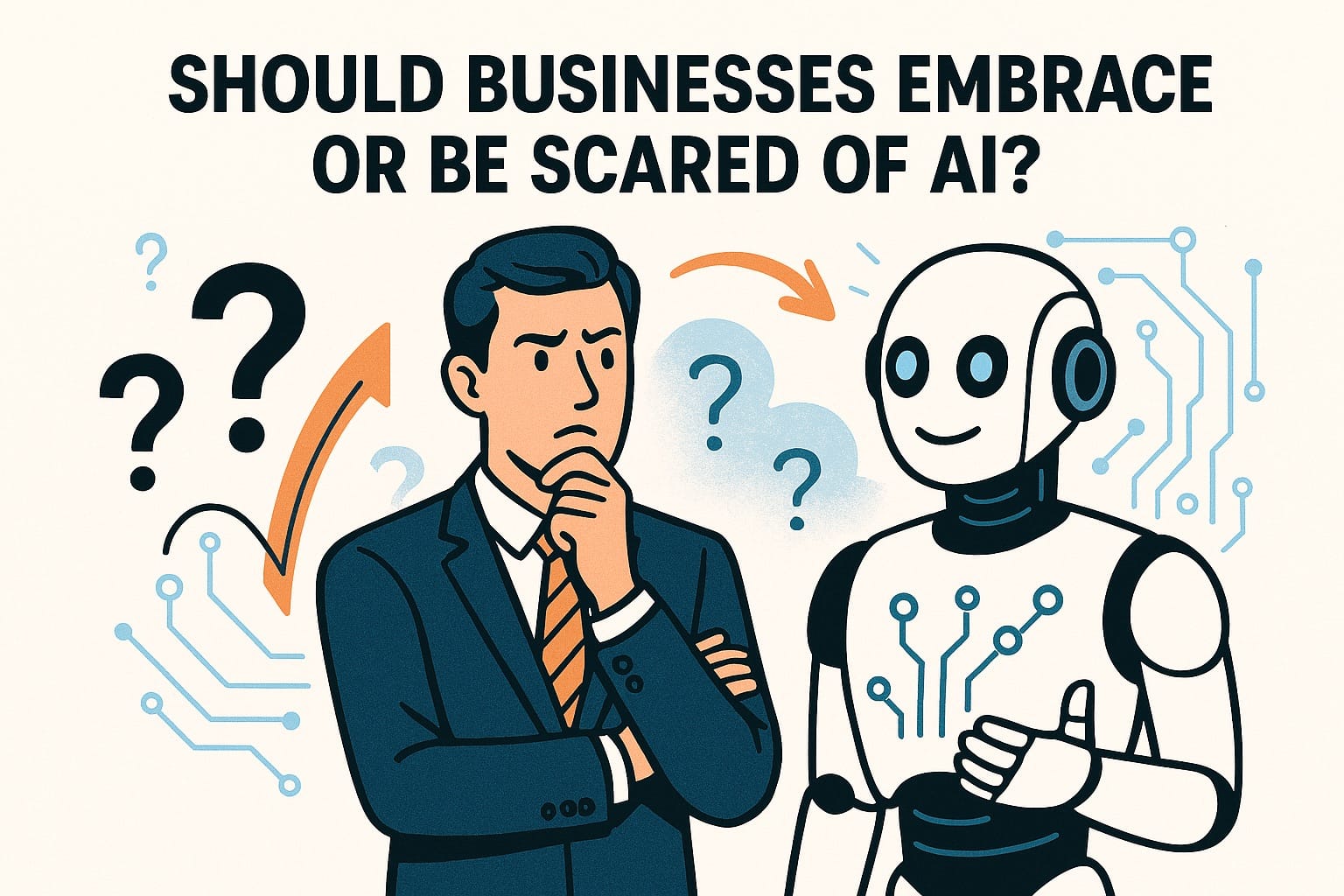Should Small Businesses Embrace AI?
The below insights were provided by David Points, a business owner and AI consultant who advises small businesses on how to use AI effectively, cost-efficiently and compliantly.
I’m not going to lie… I was very tempted to get Copilot to write this blog!
Honestly, what could be more ironic, if a post about AI was written by AI itself? 😂 In the end, rightly or wrongly, I decided my thoughts on the subject were more valuable than anything a chatbot could spit out.
What’s the worst that could happen if small firms don’t explore the potential of AI?
Well, when it comes to AI, I think most of us currently fall into two categories. We are either:
- Scared of it and doing our best to ignore it, or
- Embracing it with open arms, excited about the possibilities
Personally, I’m not one of those who fears AI is going to take over the world. Well, at least not in the way Hollywood seems to suggest. And particularly not with the face or voice of James Corden (although, I must admit, Superintelligence was a super funny film).
Instead, and as the owner of a family owned and run company myself, I’m a firm believer if we don’t embrace AI for small businesses where we can, we face the risk of being left behind. In fact, it could be far more serious than that: the organisation we have worked so hard to build could potentially face extinction in the future.
It might sound a bit dramatic, but this has happened before.
Whenever I am trying to educate my clients in developing and applying ‘risk thinking’ to their small to medium sized business, one of the examples I always use is of the video rental company Blockbuster Video.
Did you know, at its peak in the late 1990s and early 2000s, Blockbuster Video had grown to a massive scale, operating over 9,000 stores worldwide and boasting 65 million registered customers? The firm enjoyed a significant presence in the United States, with more than 4,500 stores, and additional locations internationally. The company was valued at $3 billion during this period.
You may have had one of their shops near you, then.
You don’t anymore.
Blockbuster Video filed for bankruptcy in 2010, and by 2013 all its company owned stores were closed. In fact, there is only one store left in the entire world, in Oregon. It’s known as ‘The Last Blockbuster’ and is effectively a museum of a fallen empire.
So, what went wrong? Why the fall from grace?
The answer lies in the fact their management did not embrace new technology, even though they were given the chance to.
In early 2000, when Blockbuster Video was at the peak of its success, two young joint business owners offered them the chance to buy their up-and-coming video streaming service. It was albeit a struggling new business, and their asking price was $50 million. Because of this, and potentially believing streaming videos would never take off, the CEO of Blockbuster Video flatly declined their offer.
Who was that small streaming service? You’ve guessed it. None other than Netflix.
The lesson is clear: Blockbuster Video’s management team were shortsighted. They were late to the party. They struggled to adapt from DVD rental to streaming. And by the time they did, it was too late.
It’s a scenario that has always resonated deeply with me.
So, from the moment AI burst onto the scene, we made the decision here at ADL Consultancy to try and embrace it. To explore ways in which we could implement it. Ways in which it could improve our processes and, ultimately, save us time. Time which can then be better used elsewhere within our business.
And it’s a lesson we hope other entrepreneurs and their teams are ready to heed, too.
The role of an ISO consultant in educating businesses on how to use AI
AI is not something that we will be able to use within our businesses in the distant future. It’s here now!
As an ISO consultant, I encourage small to medium businesses to explore AI with curiosity and care. Start small, experiment, and consider aligning your business’s AI efforts with ISO 42001. This new standard provides a framework for managing AI responsibly, covering risk, ethics, transparency, and continual improvement.
For business owners, adopting ISO 42001 isn’t just about compliance, it’s about building trust. It shows that your business is forward-thinking, ethical, and ready for whatever is ahead.
Ready to take the next step? Let’s talk about how AI and ISO standards can work together to future-proof your business.









Leave A Comment